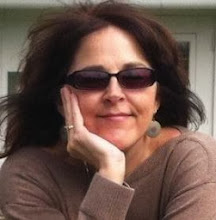She says that night that she is ready to be tossed in a box and put in the ground. This blonde haired lovely, this woman who has grown up alongside me. She sits on my couch with her reconstructed breasts, her tattooed nipples, her concentrator roaring over the strains of 70s music that the two of us have selected on the TV—that goliath machine giving her life, breath. Her quivering hand slaps at the length of hose, angling for more slack in the line, so she can move around a bit—and I see in that one quick movement that this would defeat me, being tethered like that, held down. But my lungs open and close like new, polished windows—me who has drawn smoke into their sponginess, and she has not. And her lungs are sealed shut, painted over by something unknown that picked her out of the wind and confiscated her breath--until she thought she would suffocate, she said, lying there undiagnosed in a sterile room in that Upstate town. She lay for two whole weeks, struggling for breath, while the nurse smiled, the doctor scribbled notes on a board at her feet, and the candy-striper asked if she wanted a treat. I can't breathe, she said. I really can't breathe...
That night she sips her wine on my couch and touches a trembling finger to a painful, teary eye. A side effect of some pills, and of course she knew it would attack her. We cover the eye with a $4.99 patch from the CVS, and it angers me to see her like this. Yet there is no one here to holler at, to threaten; no manager to page. Just the two of us on my couch on a winter night, and the din of her concentrator--and the empty package that the patch came in. I watch her, as each punch comes: she stands up, fists curled—this woman of the farm, born on the gentle side of things. This woman whose soul is a delicate thing--all cotton candy and grace—she stands stoic and strong as the punches keep coming and coming and coming. And what did I know, back then when we lived together in that town. I thought she was too quick to cry and asked so little of life. She stayed behind, listening to her own footsteps, waiting for love—while I boarded a bus that would take me to wide open places that I demanded all kinds of things from. And still, even tonight, she has hope that love will come, that it will come and find her because, after all, she cannot find it with one patched-over eye.
That night we drank wine and she could not see, and she said she hopes she won’t be blinded. Her doctor, when we called, was smug in his own steady breath, his own sober hand, and told her to use eye drops, hanging up the phone to turn back to his wife, to his ESPN. And my sister-in-law leaned her head back against my cotton twill couch cushion and struggled to open one ravaged eye to a doleful eyedrop from my steady hand. I stood over her, thinking how we had ridden all those waves from girlhood to the brink of middle age--and yet we never imagined this…
Tonight I am sitting on the same couch, and it’s quiet in here. She is back home, tethered, the roar of her concentrator something that has faded, for her, into the background, like the forgotten blush of new love, as the years go by and life is pumped into her nose one single pulse at a time. The transplant people tell her to keep her own lungs for as long as she can—as if there is any choice. Outside my living room windows tonight, a winter wind rages, rattling windows and banging against the summer things I forgot to take in from the patio. I listen, my bare feet propped on the coffee table, as the wind doubles back and launches itself in a chaotic dance that reminds me of the precariousness, the chaos, of life—of all of us getting knocked around one day at a time, breathing in and breathing out, until we are done.
***
Subscribe to:
Post Comments (Atom)

No comments:
Post a Comment